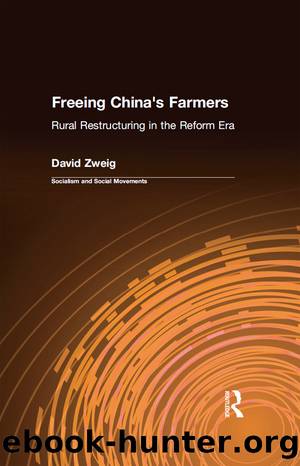Freeing China's Farmers: Rural Restructuring in the Reform Era by David Zweig

Author:David Zweig [Zweig, David]
Language: eng
Format: epub
Tags: Social Science, Ethnic Studies, General, Regional Studies
ISBN: 9781315285030
Google: DoQYDQAAQBAJ
Publisher: Routledge
Published: 2016-09-16T04:30:27+00:00
Conclusion
The new rural contracts have far-reaching implications for Chinaâs future. This is particularly true as the contracts establish the rule of law, revamp rural politics, and link complex economic relations in a mixed plan-and-market economy.
In establishing the rule of law, Chinaâs leaders must institute formal legal structures and processes and instill respect for formal legal principles and procedures. Chinaâs new institutions of the ârule of lawâ and âcontractâ do not include (at present) contracts between individuals. Such contracts do not enjoy formal legal protection (although, as the Apple Sales Case indicates, local officials may choose to protect such agreements as if they were binding contracts). Moreover, farmersâ concepts of justice and âcollective rightsâ often challenge respect for formal contracts. While numerous breaches and cases originate in cadresâ miscomprehension or contempt for contractual agreements that limit their power, a more intractable conflict exists between community claims to âeconomic rentsâ on previously collective property, developed over decades of collective labor and investment, and the individualâs contractual rights to the profits of production. While the terms of the contract might include a tax on those economic rents, changing market conditions and previously inefficient collective management make such calculations almost impossible.
In the future, more astute bargaining by both sides might reconcile individuals and collectives, as the risks to the producer and the potential profits become clearer to all when contract negotiations begin. Experience, however, will not be enough. The requirements of the state plan and the inequality of bargaining positions dictate the limits of Chinaâs present legal norms. Even with the recent reforms in the state procurement system, contractual agreements may well be involuntary for ordinary farmers; otherwise, localities will be unable to fulfill sales targets set by the state. In contract negotiations generally, most farmers remain in very unequal bargaining positions vis-Ã -vis the collectiveâwhich still owns the land, the water and the electricity, and other means of productionâand the state or cooperative purchasing agenciesâwhich control access to scarce inputs such as fertilizer, seeds, breeding stock, and technical services. Specialized households can be especially vulnerable because they need more technical inputs and credit, while their commercial output may require bulk sales that only state or cooperative agencies can manage.
Despite these limitations, at least one new principle of rights and obligations has been introduced: signed and notarized contracts place clear legal limits on the demands that state, collective, or cooperative bodies (or their agents) may impose on farmer-producers. This principle has never characterized relations between villagers and officials in the Chinese countryside since collectivization was completed in the late 1950s. As a consequence, new institutional relations and norms may be emerging in the countryside that significantly alter farmer-cadre and farmer-state relations. However, even this principle suffers from countervailing influences. Mediation remains a powerful principle, one that places individuals, who believe that their contractual rights have been violated, under considerable social and legal pressure to yield their legal rights somewhat in informal compromise solutions. The pressures on farmers confronting state cadres to accept a mediated solution must be enormous.
Download
This site does not store any files on its server. We only index and link to content provided by other sites. Please contact the content providers to delete copyright contents if any and email us, we'll remove relevant links or contents immediately.
Spell It Out by David Crystal(36117)
Life for Me Ain't Been No Crystal Stair by Susan Sheehan(35811)
Cecilia; Or, Memoirs of an Heiress — Volume 1 by Fanny Burney(32558)
The Great Music City by Andrea Baker(32020)
Cecilia; Or, Memoirs of an Heiress — Volume 2 by Fanny Burney(31956)
Cecilia; Or, Memoirs of an Heiress — Volume 3 by Fanny Burney(31942)
Professional Troublemaker by Luvvie Ajayi Jones(29665)
The Secret History by Donna Tartt(19092)
We're Going to Need More Wine by Gabrielle Union(19046)
Twilight of the Idols With the Antichrist and Ecce Homo by Friedrich Nietzsche(18635)
All the Missing Girls by Megan Miranda(16031)
Cat's cradle by Kurt Vonnegut(15359)
Pimp by Iceberg Slim(14508)
For the Love of Europe by Rick Steves(14123)
Bombshells: Glamour Girls of a Lifetime by Sullivan Steve(14077)
Talking to Strangers by Malcolm Gladwell(13371)
Norse Mythology by Gaiman Neil(13370)
Fifty Shades Freed by E L James(13243)
The Social Justice Warrior Handbook by Lisa De Pasquale(12191)
